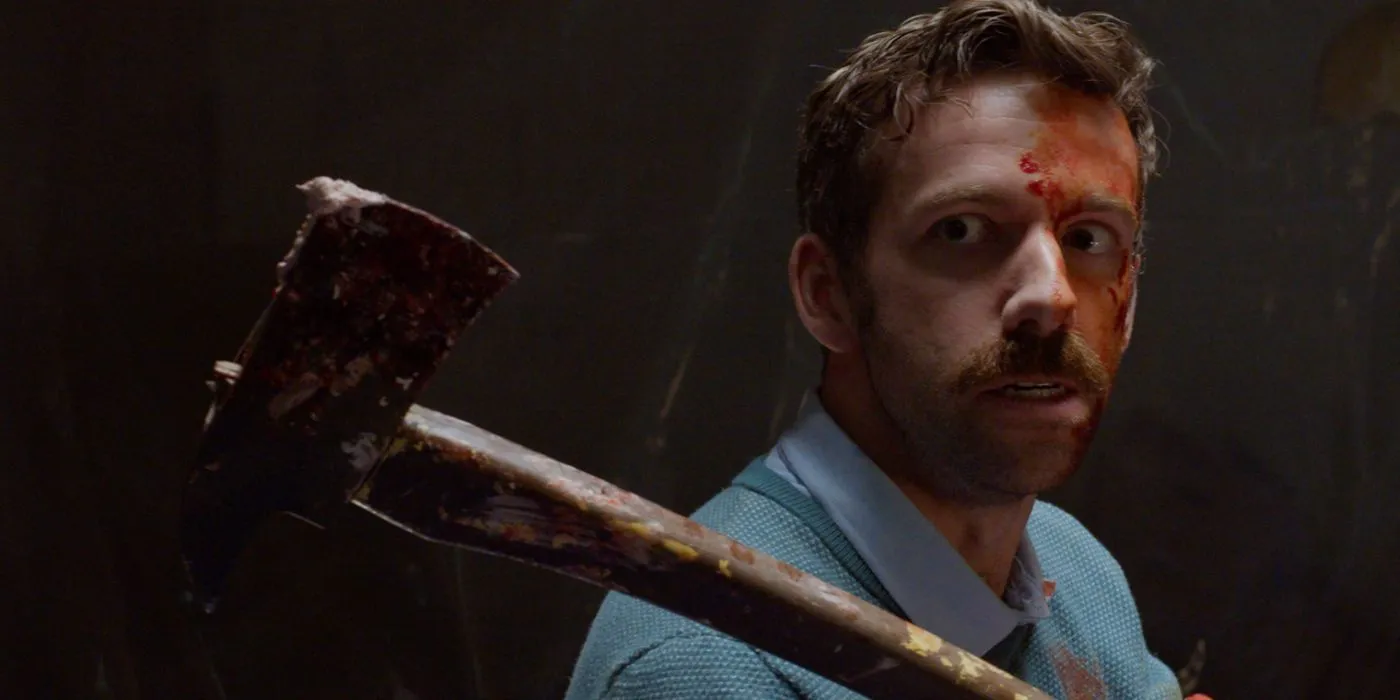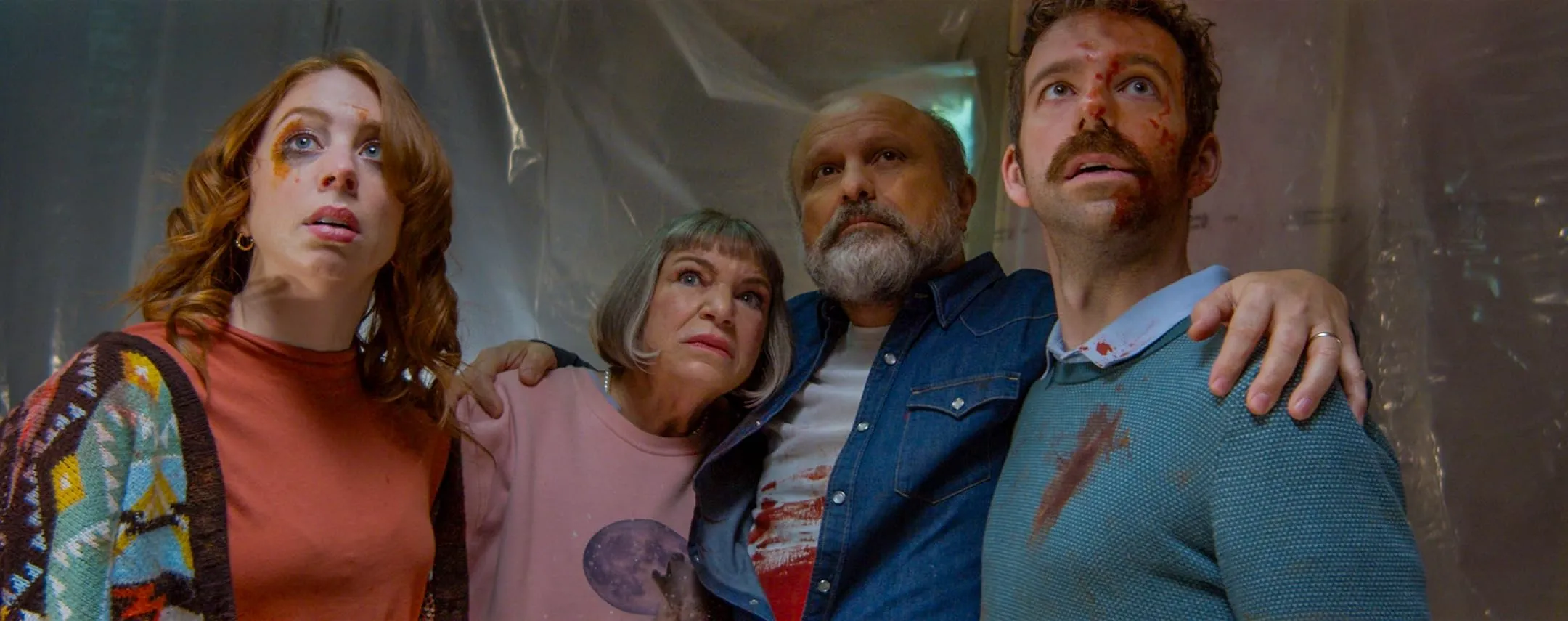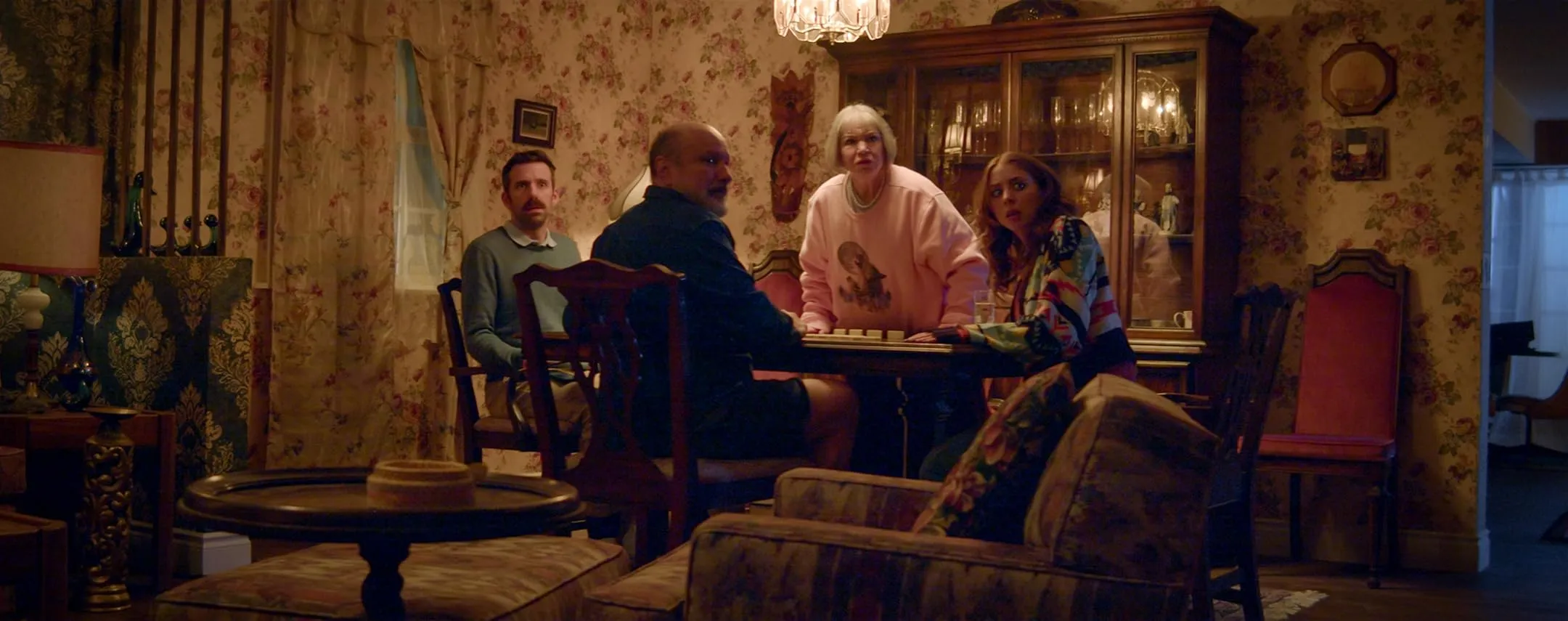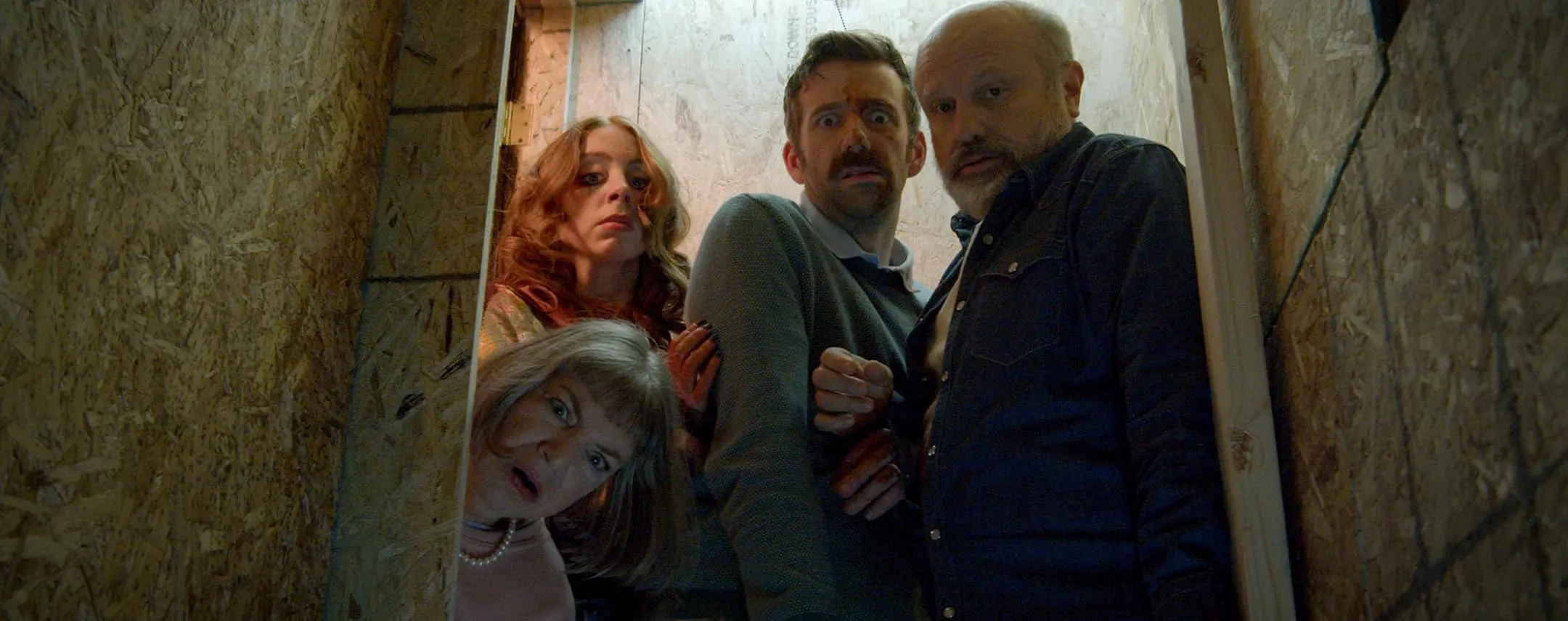The Jennings family, a microcosm of suburban life where secrets simmer beneath the surface like a pot on the stove for too long, is introduced to us in Mother, Father, Sister, and Brother Frank.
In this story, the matriarch, Joy (Mindy Cohn), badly wants the family to stay together, so she plans a Sunday dinner that turns into a crucible for suppressed truth. While their father, Jerry (Enrico Colantoni), drowns his worries in wine, her adult children, Jolene (Melanie Leishman) and Jim (Iain Stewart) navigate their labyrinthine struggles.
A chaotic cycle of violence and dark humor is set off by Uncle Frank’s (Juan Chioran’s) arrival, shattering the fragile facade of their family. Frank, a harbinger of trouble, embodies the existential threat that lurks in family ties—the possibility of destruction weaved into the fabric of love.
This film, written and directed by Caden Douglas, emerges from a personal history of conflict avoidance and the fight for authenticity, reflecting a desire to confront the unsaid horrors that haunt familial relationships. It premiered at Panic Fest and expertly walks the line between dark comedy and existential horror, making the audience ponder the weight of unacknowledged truths and how far we will go to protect ourselves.
The Unraveling Thread: A Tapestry of Secrets and Shadows
We witness a scene of tension as the Jennings family sits down to dinner, a microcosm in which familial ties are tangled around unspoken grudges and hidden facts. The matriarch, Joy, tries to maintain her vision of a perfect family gathering, but there is a lot of unhappiness in the air. Her children, Jim and Jolene, embody the struggles of modern life: one deals with the idea of becoming a mother soon, and the other deals with the end of his marriage.
The father, Jerry, tries to calm things down with humor, but all that comes out of his attempts is the sound of glasses clinking, which hides deeper worries. Each character is a source of conflict, with secrets tangled together like the roots of an old tree that is about to fall over from the weight of their pasts.
The arrival of Uncle Frank acts as a catalyst for chaos, an unwanted storm crashing into this vulnerable refuge. Frank is the personification of evil disguised as familial familiarity, portrayed with a creepy charm. His appearance throws off the unstable balance, revealing the core of the family’s dysfunction. He’s not just an enemy; he’s the harbinger of existential dread and a grim warning that the surface of things appearing normal can shatter at any moment.
Then there is the sudden and horrible act of violence—a murder that makes the family crazy with fear and laughter. As they attempt to conceal their crime, a darkly comedic ballet of incompetence plays out, with each mistake driving them deeper into a labyrinth of absurdity.
The act itself forces the Jennings to confront their deepest fears and desires. As they navigate the dangerous waters of guilt and complicity, chaos rules the aftermath, obfuscating the distinctions between right and wrong, love and betrayal. The film tackles the paradox of familial love, which can both lift us and bind us to our darkest desires, in this chaotic mix of blood and comedy.
Fractured Reflections: The Characters of Mother Father Sister Brother Frank
The Jennings family, whose interactions highlight the complexities of love and disorder, is at the center of Mother, Father, Sister, and Brother Frank. To maintain the appearance of harmony, Joy, as portrayed by Mindy Cohn, embodies the archetype of the caring but controlling mother.
Her attempts to plan the ideal family dinner are like the Sisyphean struggle of a woman caught in the vortex of her fears and desires. What is the existential question of a mother’s love? How far is one willing to go to protect something that is broken by nature? The stark realities of her children’s lives clash with Joy’s unwavering optimism, creating a poignant tension throughout the film.
As a counterbalance to Joy’s fervor, Jerry (Enrico Colantoni), the patriarch, embodies quieter desperation. In the throes of his secrets, he looks for comfort at the bottom of a wine glass but craves a real connection with his distant children. The weight of hidden facts makes me wonder if familial love can survive this duality. As the front falls apart, both parents show how weak they are, which sheds light on their marriage’s less-than-perfect parts and responsibilities as parents.
The adult children, Jolene and Jim, each navigate their conflict labyrinth. While Jim’s identity crisis and marital problems send him into a crisis of self-worth, Jolene, with her anxiety and self-denial, grapples with the upcoming responsibilities of motherhood. The larger existential themes of seeking authenticity amid familial expectations are reflected in their arcs, which are marked by moments of rebellion and reconciliation.
This is followed by Uncle Frank, the evil force that starts the chaos. In his role as the antagonist, he embodies the evil that can exist within family dynamics. His character acts as a mirror, reflecting the Jennings’ worst fears, which are their own potential for violence and betrayal. The film asks a scary question through Frank: What happens when the secrets that bind a family are tested?
Some characters, like Jim’s husband Pete and the nosy neighbor, are there to add humor and depth to the story. While the neighbor’s innocence contrasts sharply with the evening’s darker undercurrents, Pete’s drunken confrontations only heighten the absurdity. Each character adds something different to the story of what it means to be a family member. Being a family member is messy, unpredictable, and, finally, a search for connection in a world full of hidden dangers.
Beneath the Surface: Secrets, Truth, and Dark Laughter
Mother, Father, Sister, Brother Frank digs into the complicated web of family relationships, where secrets lie dormant like landmines ready to go off at any moment. The Jennings family is a good example of how unspoken facts can hurt people.
We witness how each hidden secret strengthens the familial bonds as their seemingly perfect Sunday dinner devolves into chaos, showing an unsettling truth: the ties that bind can also suffocate. The paradox of familial love is that the desire to shield one another often results in deeper wounds. In this world, conflict avoidance emerges not as a protective mechanism but as a catalyst for destruction.
The film shows the violence, making us think about what truth and acceptance mean. The Jennings family is forced to confront their darkest impulses in the aftermath of Uncle Frank’s violent death, which places them in a crucible of shared trauma. The characters grapple with who they are and why they do what they do, and this confrontation helps them grow as people.
Their carefully built masks are torn off by the chaos, leaving them in moments of raw vulnerability. This is the ultimate question: can we accept each other and ourselves when our defenses are down? According to the film, even the most traumatic events can create a sense of freedom, allowing for genuine connection.
However, the dark humor that threads throughout this narrative elevates it from a straightforward tragedy to a thought-provoking look at the human state. The absurdity of the situation—the awkward attempts to hide what is going on, the comedic timing in the middle of horror—heals the audience and lessens the weight of despair.
This contrast of laughter and violence makes space for reflection, allowing us to confront serious problems with levity. It makes you think about how humor can act as a balm, a way to navigate the complexities of life, even in the most difficult moments. In the end, Mother, Father, Sister, Brother Frank shows cleverly that laughter, even laughter tinged with irony, can help you find your way through life’s most complicated passages.
A Dance of Shadows and Laughter: Tone and Style
Mother, Father, Sister, and Brother Frank expertly navigate the tricky waters of tonal changes, weaving together the different threads of comedy and horror to reflect the complexities of human experience. In his first movie as a director, Caden Douglas skillfully balances the situation’s absurdity with the seriousness of what it means, creating a space where laughter and fear can coexist.
The funny parts, like the incredibly bad attempts to hide a murder, aren’t just there for laughs; they also contrast the darker themes. The film’s humor frequently emerges from the absurdity of familial dysfunction, emphasizing the irony that the characters frequently resort to grotesque slapstick in the middle of chaos.
Douglas’s way of telling stories, which uses a fast pace that matches the characters’ wild energy, makes this mix even better. The dialogue is full of wit and sarcastic humor, and it reveals character depths through incisive interactions that ring true to authenticity.
Each line’s weight of unspoken truths invites the audience to grapple with the existential problems Jennings is facing. The essence of family life is beautifully captured in this interplay of light and dark, leaving us to ponder the frailty of our relationships.
Embers of Emotion: Performance Highlights
The performances in Mother, Father, Sister, and Brother Frank have an emotional impact that elevates the narrative from a lighthearted comedy to a moving look at familial ties. Joy is played by Mindy Cohn, who gives the character a warm and desperate quality that makes her seem real.
The essence of a woman caught in the throes of her greatest fears—losing her family to the very secrets she tries to conceal—is captured by her ability to oscillate between maternal tenderness and fraying sanity. Enrico Colantoni, who plays Jerry, gives Cohn’s performance a rich depth by showing a guy struggling with his own flaws. The audience can relate to a character torn between duty and despair thanks to his comedic timing and moments of vulnerability.
The chemistry between the actors amplifies the film’s emotional impact. When Jolene (Melanie Leishman) and Jim (Iain Stewart) are together, they embody the struggles of modern adulthood. The tension between them as siblings comes from the fact that they share a past.
The group’s interactions, mixed with sarcastic humor and real love, paint a true picture of family life. As they navigate the chaos, the authenticity of their relationships serves as a mirror, reflecting the complexities and contradictions present in our relationships, leaving us to ponder the weight of love mixed with the shadows of truth.
Echoes of Truth: Conclusion and Impact
Mother, Father, Sister, Brother Frank emerges as a powerful look at the human condition, skillfully weaving the narrative threads of humor and horror into a story that stays with you long after the credits roll.
The film’s strengths include its sharp writing, strong acting, and brave decision to confront the uncomfortable truths beneath the surface of familial love. Its darkly comedic tone invites us to reflect on the chaos that frequently defines our relationships—how laughter and sadness coexist and how secrets can bind and shatter.
The disintegration of the Jennings family forces us, as viewers, to grapple with existential problems. The narrative acts as a mirror, reflecting our struggles with authenticity and connection and imploring us to confront the uncomfortable truths we frequently choose to avoid.
The film’s ability to balance absurdity with deep lessons about love, loyalty, and betrayal enhances our understanding of what it means to be human. Mother, Father, Sister, Brother Frank leaves us with the unsettling realization that beneath normalcy lies a labyrinth of secrets ready to be discovered in a world full of complexities. Each moment of truth resonates with the weight of shadows, telling us that understanding is often found in the shadows.
The Review
Mother Father Sister Brother Frank
The complexities of familial love are explored in Mother Father Sister Brother Frank, a masterful mix of dark comedy and existential reflection, through sharp writing and powerful performances. Caden Douglas's direction, which skillfully balances humor and horror, invites the audience to confront uncomfortable truths about truth and secrecy. A haunting authenticity permeates this film, leaving viewers to ponder the shadows that stay in their relationships. It is a somber reminder of the chaos that frequently characterizes family life with its rich tapestry of feelings and insights.
PROS
- Strong performances, especially from Mindy Cohn and Enrico Colantoni.
- Effective blend of dark comedy and existential themes.
- Sharp, witty dialogue that reveals character depth.
- Engaging exploration of family dynamics and secrets.
- Thought-provoking narrative that lingers after viewing.
CONS
- Some tonal shifts may feel jarring to certain viewers.
- Certain plot points could appear predictable.
- The pacing might be uneven for those expecting a traditional structure.





















































